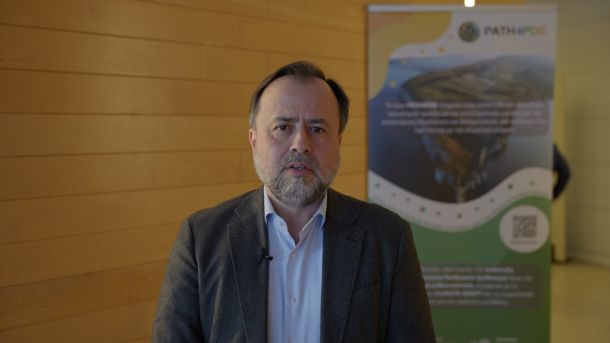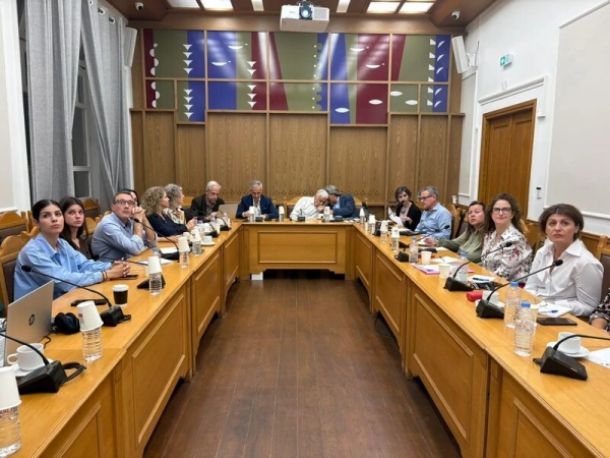The Path4PDE Baseline Report for Western Greece provides a comprehensive assessment of the region’s climate risks, vulnerabilities, and adaptation needs, highlighting rising temperatures, reduced rainfall, and more extreme weather events as key challenges. Vulnerability varies by climate scenario, with agriculture, ecosystems, water resources, tourism, public health, and infrastructure most at risk under pessimistic projections. The report emphasizes strengthening institutional capacity, stakeholder engagement, and targeted funding—boosted by a 77% increase in regional climate adaptation budgets—to support priority areas such as climate-smart agriculture, forest fire prevention, biodiversity protection, water management, and resilient infrastructure. Despite strong cross-sector collaboration, challenges remain around funding, regulatory clarity, public awareness, and data access, underscoring the need for coordinated, well-resourced efforts to build long-term resilience in Western Greece.
The delivery of the Path4PDE Baseline Report marks a key milestone in strengthening climate resilience for the Region of Western Greece. A comprehensive initial assessment is a critical first step in designing effective adaptation strategies, as it helps identify key risks, vulnerabilities, available resources, and existing policy frameworks.
Baseline report sets priorities and highlights the most pressing areas for intervention. Its analysis includes the mapping of the interconnections between the economy, society, and the environment and the definition of the baseline resilience level, providing a reference point for monitoring future progress and fostering collaboration across sectors.
The Region of Western Greece reaffirms its strong commitment to climate resilience, increasing funding by 77% under Pillar 3 (Innovation, Sustainability, Competitiveness, and Climate Change Adaptation) of its Development Action Plan 2025–2028 to support innovation and targeted adaptation initiatives.
Key priorities include climate-smart agriculture, forest fire prevention, protection of biodiversity in Natura 2000 areas, sustainable water management, resilient transport networks, adaptive urban planning, and safeguarding cultural heritage sites like Ancient Olympia.
The report highlights the importance of Path4PDE’s efforts to consider how vulnerable groups are affected by climate change and to ensure their needs are integrated into regional resilience planning, which is particularly important given the Region’s heightened risk of poverty.
Climate profile of the Region of Western Greece
🌡️ Average Temperature
The Region of Western Greece has an average annual temperature of 13.7°C, with:
🔥 Ilia: Warmest area (15.2°C)
❄️ Achaia: Coolest area (12.5°C)
🌧️ Annual Precipitation
Average precipitation is around 1,025 mm, with:
🌊 Thermo: Highest (1,370 mm)
🌧️ Amfilochia: (1,205 mm)
🌦️ Nafpaktia: (1,153 mm)
🌤️ Aigialeia: Lowest (716 mm)
💧 Relative Humidity
Average: 72.6%
🌫️ Kalavryta: Highest (74.7%)
🌬️ Western Achaia: Lowest (70.6%)
🌍 Bioclimatic Character
🏖️ Coastal zones: Mild thermo-Mediterranean profile
⛰️ Inland/mountainous areas (e.g., Kalavryta, Aetolia-Acarnania): Cooler, wetter meso-Mediterranean conditions
Regional Adaptation Action Plan and Regional Vulnerabilities
According to the Regional Adaptation Action Plan (RAAP) (2022), the RWG is expected in the coming decades to face rising temperatures, reduced rainfall and snowfall, more frequent and intense extreme weather events (droughts, floods, heatwaves), and sea level rise. Three Representative Concentration Pathway (RCP) emission scenarios were considered: Optimistic (RCP2.6); Intermediate (RCP4.5); and Pessimistic (RCP8.5), across three forecasting horizons: Short-term: 2011–2030; Mid-term: 2031–2050; and Long-term: 2081–2100.
Vulnerability in Western Greece varies by climate scenario. It’s low under optimistic conditions, rises in key sectors under intermediate scenarios, and becomes widespread and severe in the pessimistic scenario, impacting agriculture, ecosystems, water, tourism, health, and infrastructure. Overall, as the scenario worsens, the level of sectoral vulnerability increases accordingly, as indicated in the following table.
|
Scenario |
Sectors with Significant Vulnerability |
|
RCP2.6 |
Rivers, transportation, cultural heritage, and the built environment (moderate vulnerability over the long term) |
|
RCP4.5 |
Agriculture, biodiversity, water resources, tourism |
|
RCP8.5 |
Agriculture, ecosystems, water resources, tourism, public health, and infrastructure (very high vulnerability) |
Regional Adaptation Objectives
Assessing climate vulnerability highlights the need to prioritize adaptation. The Region of Western Greece faces challenges due to administrative gaps, limited capacity, and funding shortages. Recent efforts to integrate climate resilience into planning are still developing. Strengthening institutions, clear guidelines, and funding prioritization are essential for effective adaptation and resilience building. The Region of Western Greece’s self-assessment shows moderate climate resilience maturity, strong in scenario development and option identification but weak in intervention planning and preparation. Key priorities are to:
· Enhance system understanding through data analysis.
· Build collective commitment via broad stakeholder engagement.
· Accelerate intervention design with clear goals and timelines.
· Develop implementation mechanisms emphasizing capacity, resources, and partnerships.
Stakeholders Engagement
A total of 46 organizations consented to data processing, representing a diverse range of public stakeholders essential to climate resilience planning and implementation. The wide participation of different departments from the Region of Western Greece, Municipalities, and the Universities highlights effective cross-sectoral collaboration across technical, environmental, health, and academic fields. This multi-level, interdisciplinary engagement is vital for advancing successful regional resilience policies.
|
Category of Organization |
Number of Participants |
Subject Relevance |
Note |
|
Region of Western Greece |
11 |
✅✅✅ |
Central role |
|
NATURAL ENVIRONMENT AND CLIMATE CHANGE AGENCY |
5 |
✅✅✅ |
High technical competence |
|
University of Patras |
3 |
✅✅✅ |
Scientific support |
|
Municipalities |
13 |
✅✅ |
Need for technical support |
|
Forestry |
4 |
✅✅✅ |
Critical for fires and soil resilience |
|
Technical Chambers |
2 |
✅✅ |
Project/Environmental expertise |
|
Ministry of the Environment and Energy |
2 |
✅✅✅ |
National planning, forest inspection |
|
Chamber/Hotels |
2 |
✅ |
Underrepresented |
|
Civil Protection |
2 |
✅✅ |
Need for greater participation |
Following a stakeholder meeting, a questionnaire was developed to capture the needs of academia, authorities, and professional organizations. Results show that climate change in Western Greece is primarily perceived through extreme events like wildfires and floods, emphasizing the urgent need for prevention and resilience measures. The main barriers identified are limited funding and unclear institutional frameworks, underscoring the need for stable financing and regulatory clarity. Low public awareness and limited data access were also highlighted, pointing to the importance of improved information campaigns and data systems for effective planning.
Budgeting Process & Finance
The 2024 Transitional Annual Action Plan (AAP) includes 607 projects funded by a mix of national and European sources. More than half (53%) of the budget comes from national funds, followed by 17% from the NSRF and 12% from other European funds. Key funding sources include:
· Regional Operational Program (ROP) 2021-2027 with a €628 million budget; 20.2% allocated to green and climate resilience objectives.
· National Recovery and Resilience Plan (Greece 2.0) with a €30.5 billion budget supporting sustainability and climate resilience.
· Green Fund, financing environmental actions including a €30 million “Natural Environment and Climate Resilience” program.
· Interreg programs (Euro MED, NEXT MED, Adriatic-Ionian, Greece–Italy, Europe) with ongoing and planned projects.
· Other European grants such as Horizon 2020, LIFE Program, and Connecting Europe Facility (CEF).
· Recovery and Resilience Facility (RRF) with €3.93 billion allocated nationally as part of Greece 2.0.
· Rural Development Program (RDP) with a €13.1 billion budget and €75.7 million dedicated to energy efficiency, water management, pollution mitigation, and climate adaptation in Western Greece.
In conclusion, the Path4PDE Baseline Report lays a vital foundation for enhancing climate resilience in Western Greece by thoroughly identifying risks, vulnerabilities, and priorities. The region’s proactive increase in funding and strong stakeholder collaboration demonstrate a clear commitment to addressing climate challenges. The next steps include developing a comprehensive climate resilience strategy, along with detailed action and investment plans, to guide the Region of Western Greece in implementing targeted adaptation measures. With focused investment and inclusive planning, Western Greece is well-positioned to strengthen its resilience and safeguard its economy, environment, and communities against the growing impacts of climate change.


